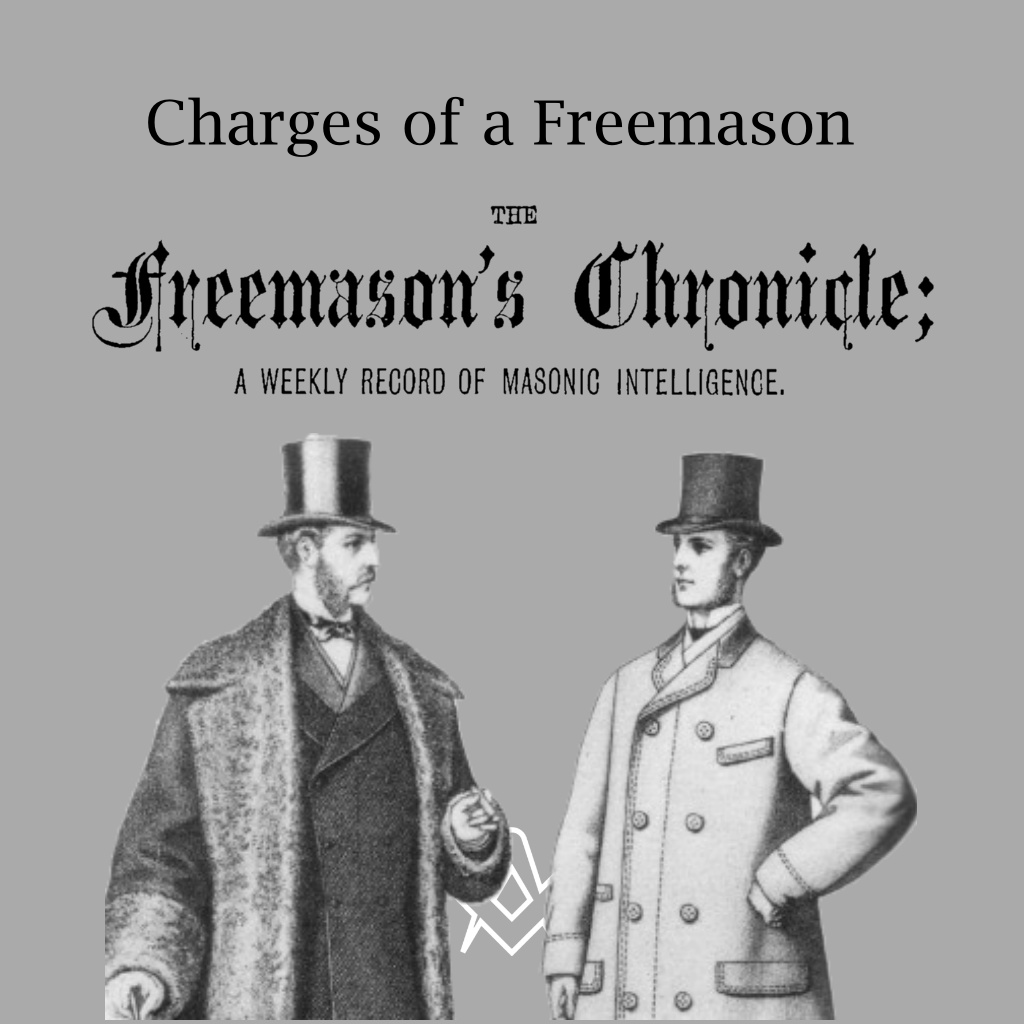Masons are but men, and holy as are the principles deduced from our rituals and emblems, and pure as are the designs upon our great moral trestle-board, still men may differ in opinion, in reasoning, and in conclusions.
Charges Of A Freemason.
By Coenelius Moore, Editor of The Masonic Review.
The Freemason’s Chronicle – 4 December 1875
Masons are not infallible more than other men ; and hence differences may arise among them which need to be investigated and adjusted.
The Lodge is the proper tribunal to adjust and settle such difficulties when they arise. If either party is dissatisfied with the decision, he may appeal to the Grand Lodge, but the decision of that body is always final.
Every brother must “stand to that award and determination;” for, as only Masonic matters can be considered by these tribunals, every brother is bound to submit quietly to the final award.
If the difficulty be of such a peculiar character as to require a different reference—if the ” Lord’s work would be hindered” by waiting for the action of the Grand Lodge—in that case a special reference may be made of it by eminent of parties.
By the ” Lord’s work” is meant, in speculative Masonry, the work of the Order: if by taking the difference to the Grand Lodge for adjustment, the work of the Lodge would be arrested, the parties directly interested should consent to an amicable reference, that it may be more speedily decided and settled.
Masons should ” never go to law about what concerneth Masonry,” unless the Lodge should be satisfied that there is an absolute necessity that legal tribunals should adjust the dispute.
The directions in this paragraph are given, not because there is frequent occasion to refer to them, but that should any arise, the mode of settlement may be plain. ” Live in peace,” is an injunction often repeated from the Orient, and all ” know how good and how pleasant it is for brethren to dwell together in unity.”
The last section provided for the regulation of conduct while the Lodge is in session; the present makes some important suggestions about behaviour after the Lodge is closed, but while the members are yet together. Formerly, there was much more conviviality among the Craft, when not at work, than at the present day.
When the work of the evening was ended, feasting, sentiments, and songs, were ” next in order;” but this practice is now almost entirely abandoned.
Some-times at the session of a Grand Lodge, or on a festival day, the brethren dine together, and enjoy themselves in social converse, but rarely at other times, and even at these festivals, it is now generally considered disreputable to introduce the use of intoxicating liquors.
Our modern festivals are held in public, and the female friends of the members often participate with them on such pleasant occasions. But the ancient practice was to have refreshments in the Lodge ball, and when the work of the evening was over to retire to the festive board.
For such occasions the charge was prepared ; and it was so plain and appropriate that it needs no exposition to be under-stood—no urgency to enforce it: it commends itself to every considerate Mason. No private or persona l disputes must ever be brought into the Lodge room for discussion; much less any disputes about religious or political opinions or policy.
As Masons, our religion is Catholic, that is, universal; and no private dogma or opinion should ever be intruded into such gatherings of friendship. We are of various nations, languages, and kindreds, find our religions and political opinions are also various.
It cannot be expected, therefore, that we should all entertain the same opinions in these matters; but we ” agree to differ,” while we unite in the ” grand design of being happy and communicating happiness.”
It is added that, ” this Charge has been always strictly enjoined and observed; but especially, ever since the Reformation.”
The reason why it has been specially enforced since that period is, that much greater diversity in religious opinions exist than formerly; and, therefore, the greater danger of introducing discord and bad feelings, in here only ” peace and unity ” should over exist.
Masons cannot be too careful to exclude from their meetings every element of contention; and the only strife permitted there should be, ” who could best work and best agree.” This section, we think, needs but little comment. It allows of Certain liberties when the Craft are alone together, that should be restrained in the presence of those not Masons.
They may converse on, Masonry, receive and impart instruction, and keep each other advised of the condition and progress of the Order. But their communications must be courteous and respectful; for though we are enjoined to call each other brother, and meet upon the level, yet Masonry does not remove the distinctions which always exist in social life, on account of station, talents, or moral eminence.
But no station should make us forget that we are brethren; that we are descended from the same stock, partake of the same nature, and share the same hope;” and that ” soon all distinctions but that of goodness shall cease.”
These should never be forgotten. To keep sacred and inviolable the mysteries of the Order,” is one of the earliest and most positive injunctions laid upon the new made brother.
This is a duty he may not, must not neglect. To reveal the secrets of Masonry to one not entitled to them, is the highest offence against the Order, and one, at the bare thought of which, every good Mason would shudder. But the secrets of Masonry maybe revealed—unlawfully revealed—without intending to do so on the part of him who commits the offence.
And though there may be no criminal intent in the act, yet the consequence would be the same. Hence the necessity of extreme caution, especially on the part of young and inexperienced brethren, when in the presence of those not Masons, or of strangers whom you do not know to be Masons.
The writer, in an extensive intercourse with the Craft for many years, and in different States, has witnessed many indiscretions in this behalf… Brethren in company presume too much—venture too far—-without knowing, from legal information, that all within sight or hearing are Masons. In these matters nothing should be presumed; wait until you can legally say, I know, then speak freely.
Every Mason recognises his obligation to preserve the secrets of Masonry from those unauthorised to receive them; but it is also incumbent upon every Mason to keep secret the transactions of the Lodge. Much evil is sometimes done, when a candidate has been rejected, by some incautious brother revealing the fact either to the candidate himself, or someone not a Mason.
Such conduct is highly un-masonic and dishonourable, and no one should be allowed to repeat it without meeting with a prompt rebuke.
Even our families and our most intimate friends, should be kept in ignorance of those transactions which occur within the tiled recesses of the Lodge room.
A Mason who will reveal these forbidden things to any one, not a Mason, is a bad man as well as a very unwise one. He has under-taken to keep them secret; hence by revealing them he violates his vow, ruins his reputation, and produces discord and confusion.” Lock up your treasure in your own breast.”
Temperance is a cardinal virtue of the Order; temperance in all things, whether it be indulgence in food, drink, or pleasure, or in excessive labour. A man should not drink too much of anything, and more especially of alcoholic or stimulating liquors.
Indeed, the former should not be used at all, except as a medicine; for its use as a beverage is productive of evil only. We may eat intemperately also, as well as drink; but in the latter case, intemperance consists in eating too much, not as in the former, in eating at all.
Nature demands food—it revolts at alcohol. But we should eat no more than nature requires; when we go beyond this point, it becomes intemperance. We may be intemperate in going to the Lodge too often, or staying there too late at night.
Every labouring man needs a certain amount of rest, as well as time for study and reflection, and evenings are almost the only hours which a labouring man can devote to these. Once or twice per month, as a general rule, is as often as a brother should attend the Lodge; the rest of his evenings should be devoted to his family, to rest, and to the cultivation of his intellectual and moral nature.
Late hours at the Lodge should also be avoided ; at a reasonable hour every brother should be at home with his family, for his family has the first and highest claims upon him.
His health, too, should be consulted, and health cannot be preserved unless a reasonable portion of time is devoted to rest. Nature’s laws were enacted by God himself, and are imperative upon all. Be temperate, then, in all things.
In the examination of strangers, either in private, or as visitors at a Lodge, great care and circumspection should be observed as a general rule, unless there be an urgent and special reason for it, no examination should take place except at the meeting of a Lodge.
Young Masons, especially, should be exceedingly careful in their intercourse with strangers professing to be Masons. Until they are well skilled in the art, and have sufficient experience to guard against the wiles and cunning of designing men, they should never attempt to examine into the Masonic qualifications of a stranger, unless an old and experienced brother be present.
Great care should also bo exercised at Lodges, in the selection of committees to examine strange brethren who wish to visit the Lodge. That is a work which should never be entrusted to inexperienced hands. Men in years, and eminent for their knowledge of the art, their prudence, address, and sound judgment should always be detailed for this duty.
A stranger should be “cautiously examined, andin such a manor as prudence shall dictate. The stranger should be treated civilly, courteously, and respectfully. We have frequently heard complaints about the manner in which strangers are sometimes treated on such occasions: they should be received as gentlemen, and regarded as honest and true, until they are proved to be otherwise; then it will be time enough to ” reject them with contempt and derision.”
If, after a proper and thorough examination, you are satisfied the stranger is a “true and genuine brother, you are to respect him accordingly.”
He should be no longer a stranger, but at home and among his brethren. It makes no difference whether he be rich or poor, or what his creed or country; if he be a good and true Mason he should be welcomed with open arms and sympathizing hearts .
If the stranger be in want, he should be relieved if possible; if you cannot do it yourself, you should put him in the way of being relieved. If you have employment for him, give him work, and pay him his wages ; if you cannot employ him, direct him to someone who can, and thus aid him in procuring work.
In these cases, however, it should always be remembered, that none but worthy brethren are entitled to your regard and assistance. An unworthy Mason, like an impostor, should be treated “with contempt and derision.” The old rule is as good now as ever, ” he that will not work should not eat.”
This final section of the Charges is of great importance, especially in its bearing upon the social duties and relations of Masons. Having settled, in clear and unmistakable terms, the great fundamental and immutable principles of the Order; having pointed out those elementary laws and usages which lie at the foundation of Masonry, and which must remain unaltered and unalterable to the end of time.
The Charges next proceed to lay down rules of conduct, and define certain social duties, the observance of which are absolutely necessary to secure good order, peace, and prosperity in the great Masonic family throughout the world.
The importance of these, every discerning Mason will at once discover, for they commend themselves to the judgment with a force which admits of no repulse.”
All these Charges you are to observe!”—Brother, write that sentence upon your memory, and never forget that ” these Charges “are a changeless law, and of enduring obligation. And not only these, but ” those that shall be communicated to you in another way,”—that cannot be written, but which are in harmony with these, and equally binding.
An epitome of the social duties embraced in the Charges follow:—
To cultivate brotherly love, avoid wrangling, slandering, backbiting, and to live in peace and fraternal affection—these must be observed.
You are not only to avoid injuring each other’s good name and character, but you are to protect the character of every ” honest brother,” and do him all the ” good offices” yon can, “as far as is consistent with your honour and safety, and no further.”
These rules, if strictly obeyed in the spirit in which they are given, would unite the Craft in one ” indissoluble bond of sincere affection,” and diffuse a spirit of peace and goodwill throughout the entire family of man.
Further than this: if disputes and differences should unfortunately arise, a wise provision is made for their adjustment. The matter should be brought before your Lodge or his for adjustment, and but few cases need go any further. If, however, it cannot be satisfactorily settled there, then an appeal may be taken to the Grand Lodge ‘or final decision.
Disputes between the members of the Order should never be taken before the legal tribunals for decision, unless they” cannot be otherwise decided.”
But even then, the Master and members of the Lodge should kindly offer their mediation, and try to” put a speedy period to all lawsuits,” that all may be prepared to discharge their Masonic duties with ” alacrity and success.”
Such is the advice which Masonry gives; such the kindly admonitions which her Charges breathe; and if they are heeded, as they should be by every brother, they will have a most favourable influence, not only upon the Craft, but upon society at large.”
Amen, so mote it he.”—This is the crowning wish, the earnest prayer breathed from the heart, that these Charges may be heeded by the Craft, and that ” the benign influence of Masonry ” may be seen and felt for good in all the world, and to the end of time. So be it now, and so may it ever be.
This is the spirit of the closing invocation, and every generous and manly heart must echo the sentiment.
This ends the “OLD CHARGES.” We have carefully examined them, and find nothing objectionable, but much that is wholesome intendency, healthful in influence, and of sound, as well as great, practical importance.
They bespeak a clear insight into human nature, and, as far as anything short of inspired wisdom can, meet the necessities of social life, restrain the passions of men, throw light along the dreary path in which we travel on earth, and awaken the best feelings of our nature in behalf of our brother man.
They do not pretend to provide for our eternal welfare, but they are well calculated to prepare us for the reception of those higher and still more important truths which God has revealed, and which are sufficient to direct us into that path which “leads to a glorious immortality.”
 The Freemasons Chronicle, a weekly record of masonic intelligence, was first published 2nd January 1875 London, England as an independent weekly journal of masonic interest and continued for 27 years.
The Freemasons Chronicle, a weekly record of masonic intelligence, was first published 2nd January 1875 London, England as an independent weekly journal of masonic interest and continued for 27 years.
It should be the business of a journal devoted to the interests of the Order to attempt the removal of prejudices such as these, which, though they may have little perceptible influence upon the prosperity of the Fraternity, yet have the effect of preventing timid or ill-informed persons from enlisting under its banner.
It will not only attempt to keep pace with the growing literary requirements of the day, but it will seek to exhibit the Order to the non-Masonic world divested of its technical details, and clothed in the garb of Charity and Brotherly Love.
The questions of the hour, which exercise the minds of thoughtful men, will be handled freely and broadly, without any tinge of political or sectarian bias.
The memoranda of Masonic gatherings which will appear from week to week, will be full and accurate; and as free interchange of opinion is one of the best signs of life and vigour in any society, ample scope will be given for Correspondence on topics of interest to the Order.
If we may venture upon a new rendering of words which recent events have made memorable, we will say here, once and for all, that we will be keen men of business, and will spare no effort, consistent with honour, to achieve commercial success; but first, and before all things, we will prove to our brethren and the world that we are FREEMASONS.
Recent Articles: The Freemason's Chronicle
 Operative And Speculative Masonry Explore the fascinating transition from Operative to Speculative Masonry in our latest post. Discover historical insights from Augustus C. L. Arnold and Rev. Wm. P. Strickland, shedding light on Freemasonry's evolution and its enduring principles. Dive into the rich history and significant milestones that shaped modern Freemasonry. - The Freemason's Chronicle - 2 September 1876 |
 Discover the true essence of Freemasonry, an ancient order founded on the profound principles of love for God and man. It's a call to rise above mere appearances, to embody genuine virtue and benevolence, transcending societal pretense. Embrace the transformative power of simplicity, and let the authentic glories of Freemasonry inspire your path. |
 Discover the intriguing story of a man who became a Mason but openly professed his dislike for the institution. Unravel the peculiar circumstances that led him down this path and explore the unexpected consequences that followed. Dive into this thought-provoking account that challenges our notions of loyalty and reveals the complexities of human nature within the Masonic fraternity. |
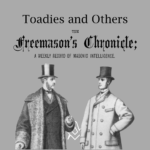 In the realm of Masonry, the principles of equality and respect are paramount. Yet, the presence of toadies—those who obsequiously seek favour from the influential—threatens these ideals. While Masonry embraces diverse beliefs and backgrounds, it rejects the sycophantic behaviours of toadies, flunkeys, and tuft-hunters, urging members to uphold genuine respect and self-worth. The Freemason's Chronicle - 22nd January 1876 |
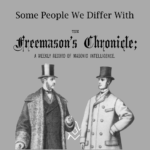 Unveiling the Unpleasant: Some People We Differ With Discover the intriguing dynamics of quarrels within the Masonic brotherhood. From the cantankerous to the litigious, the peevish to the vengeful, delve into the characters that challenge fraternal harmony. Explore their motives, temperaments, and the art of navigating disputes with these fascinating brethren. Brace yourself for a riveting journey into the world of conflicting personalities. |
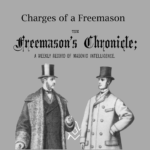 Unravelling the Masonic Mystique: A Deep Dive into the Freemasons' Charges - Explore the intricate world of Freemasonry, its principles, rituals, and the mechanisms for resolving internal disputes. Discover how this ancient fraternity fosters unity, promotes moral conduct, and upholds the sanctity of its secrets, while navigating the complexities of modern society. - The Freemason's Chronicle - 4 December 1875 |
 Unlock the hidden lessons of Masonic Studies! Don't settle for superficial knowledge or mere rituals. Discover the true depth and meaning behind Freemasonry. Expand your understanding of Tracing-Boards, Lectures, and more. Join regular Lodges of Instruction to enhance your Masonic journey. Become a knowledgeable Freemason, not just a token-bearer. Unleash the power of true Masonic wisdom today! |
 Uncover the incredible story of how Masonry saved the life of a Crimean War foot soldier in this historical and masonic account. Through the first hand experience of a soldier engaged in fierce hand-to-hand combat, witness the fateful encounter with a Russian Freemason that changed the course of his life. Learn how brotherhood and a deep dedication to the craft can lead to unforeseen and life-saving circumstances on the battlefield. |
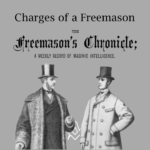 The Freemason's Chronicle - Charges of a Freemason The secrets of Masonry are the exclusive property of the Craft, and can never be communicated to one who is a mere labourer and not an accepted Mason. Hence, no labourer, that is, one who has not been regularly initiated in a legal Lodge. Article first published in The Freemason's Chronicle, 27 November 1875 |
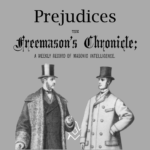 The Freemason's Chronicle - Prejudices Prejudices are partial judgments in favour of, or against certain persons or things, and, for convenience sake, may be ranged in two categories—those which are, comparatively speaking, harmless, and those which are harmful. Article first published in The Freemason's Chronicle, Oct. 2 1875. |
 The Freemason's Chronicle - Cliques Is Freemasonry - a Clique ? Man has been defined as a gregarious animal, but in his highly civilised condition he is gregarious only to a limited extent. First published in The Freemason's Chronicle, Oct. 2 1875, addresses the same challenges then as now. |
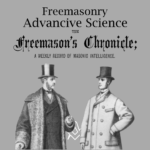 The Freemason's Chronicle - Freemasonry - an Advancive Science Is Freemasonry - an Advancive Science ? Not to confuse advancement with innovation. Has it been the case that Freemasonry's survival for 300 years plus is due to being an Advancive Science, tending to advance. First published in The Freemason's Chronicle 18 September 1875, addresses the same challenges then as now. |
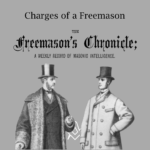 The Freemason's Chronicle - Charges Of A Freemason An interpretation of the "Charges of a Freemason", written Bro. Cornelius Moore and published in 1875, that introduce certain opinions that for some readers, will not sit well in contemporary times. - The Freemason's Chronicle, Sept. 11, 1875 |
 On The Order Of The Temple And Its Doctrine. THE Order of the Temple is divided into two great classes, denominated respectively the Order of the Temple and the Eastern Order. The Eastern Order gave birth to the Order of the Temple, and in the course of time has become an appendage of the latter. It is in ancient Egypt that we find the cradle of the Eastern Order. The Freemason's Chronicle, Sept. 4, 1875 |
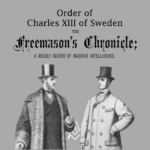 Order of Charles XIII of Sweden The following translation of the Manifesto of King JL Charles XIII of Sweden, on the occasion of his establishing the Masonic Order which bears his name, and of the Statutes of the said Order, may be interesting to our readers. The Freemason's Chronicle, Aug. 28, 1875 |
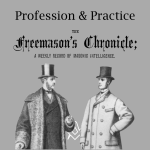 Most of our readers in the course of their experience, have doubtless met with enthusiastic brethren who take it for granted that a Mason can do no wrong. These enthusiasts are thoroughly convinced that the vast majority of those who join the Order are the most benevolent, the most moral, and the very noblest members of society. - The Freemason's Chronicle 10 July 1875 |
 An article investigating the relationship between masonry and citizenship. Are the principles of Freemasonry aligned with the freemason's claim to be a better citizen of the world? The Freemason's Chronicle - 19 June 1875 |
 A visitor must make clear his identity to the satisfaction of the Lodge he proposes to visit. More than once have we been asked to explain our views as to the reception of strangers in a Lodge. - The Freemason's Chronicle - 29 May 1875 |
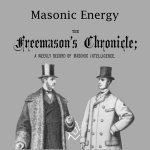 Is there reason in the accusation that Masonic energy looks only to a course of good feeds, when we can point to such grand results as have been achieved in these latter years, both in respect of the extension of our Order ? - 1May 1875 |
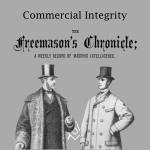 Implementing Freemasonry's peculiar system of morality in our day to day business affairs was the topic of this article, Commercial Integrity, first published in The Freemason's Chronicle - 8 May 1875 |
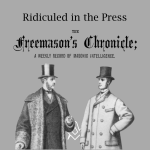 Ridicule has been somewhat illogically described as the test of truth. If it were so, Freemasonry ought to have perished long since. Two press reports from May 1875 covering the |
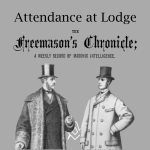 There are many things which Freemasonry will do for a man in the way of opening his mind and giving him larger and kindlier views of life, but Freemasonry itself, cannot eradicate the natural bias of the disposition. |
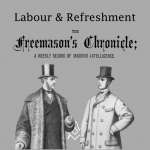 There is, we fear, too marked a tendency in very many Lodges to hasten through its labours, with a view to entering, as soon as possible, upon the business of refreshment. - The Freemason's Chronicle 17th April, 1875 |
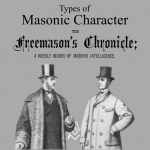 Another example that demonstrates that nothing really changes in Freemasonry. In an article the Types of Masonic Character published 145 years ago in The Freemason's Chronicle 10th April, 1875 |
 A brief history on the relationship between the British Monarchy and the craft - The Freemason's Chronicle 20th March , 1875 |
 What are the qualities of a convivial man and how does this dovetail perfectly in to Freemasonry ? 16th March, 1875 |
 A review of the "Sketch for the History of the Dionysian Artificers," a fragment, by Hyppoli to Joseph Da Costa - This little work may be regarded as, so to speak, the Holy Grail of Masonry. |
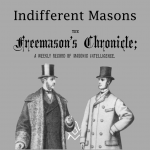 Nothing really changes, an article Indifferent Masons, From Le Monde Maçonnique 1874. Translation published in The Freemason's Chronicle 20th February, 1875 |
 In handling an intruder in the lodge, we endeavoured to show that a good Mason should be a gentleman, and a sincere man. The Freemason's Chronicle 20th February, 1875 |
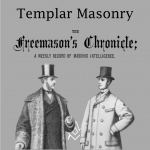 Templar Masonry - a historical aspect of the Religious and Military Order of the Temple published in The Freemason's Chronicle 13th February, 1875 |
 Secrecy perhaps the strongest objection urged by the enemies of the Masonic Order against its existence published in The Freemason's Chronicle 20th March 1875 |
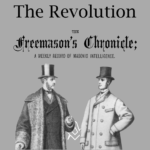 Freemasonry In The United States during And After The Revolution We take a look at Freemasonry in the United States during and after the Revolution first published in The Freemason's Chronicle - February 6, 1875 |
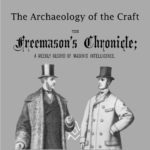 We take a look at the archaeological connection with the Craft, first published in The Freemason's Chronicle - January 30, 1875 |
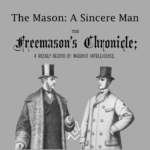 What it means to a Freemason to be a sincere man. Extract: first published in The Freemason's Chronicle - January 23, 1875 |
 What it means to a Freemason to be a citizen of the world ? First published in The Freemason's Chronicle - January 16, 1875 |
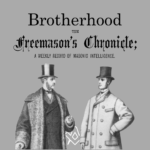 Brotherhood! In that one word what sympathetic associations arise. First published in The Freemason's Chronicle - January 9, 1875 |
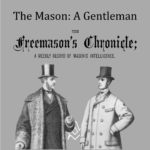 This opening article was written 145 years ago, yet it resonates with Freemasons today as it did then. First published in The Freemason's Chronicle, January 2, 1875, Issue 1 |
masonic knowledge
to be a better citizen of the world
share the square with two brothers

click image to open email app on mobile device


